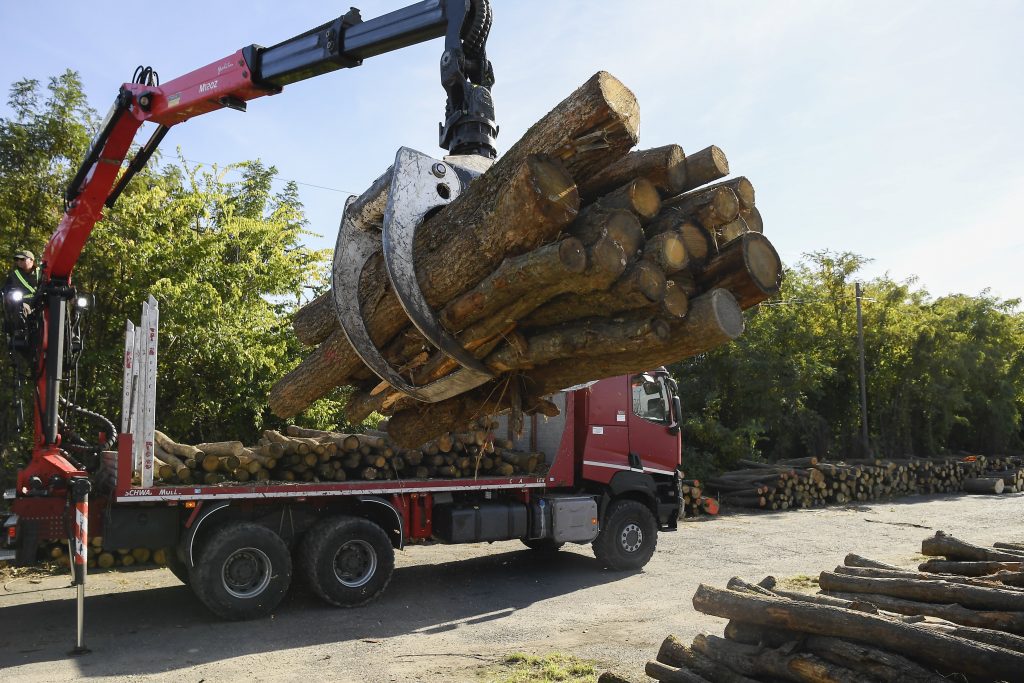The https://english.atlatszo.hu use cookies to track and profile customers such as action tags and pixel tracking on our website to assist our marketing. On our website we use technical, analytical, marketing and preference cookies. These are necessary for our site to work properly and to give us inforamation about how our site is used. See Cookies Policy
Prohibited, but still happening – Hungarian style ‘export ban’ on firewood
In a press release entitled “Another emergency measure: firewood exports from Hungary are banned“, the Ministry of Agriculture announced on 9 August that “due to the war and the energy crisis caused by the Brussels sanctions, the government is imposing an export ban on energy carriers, including firewood.” The news was picked up by much of the Hungarian press, right and left, with a broadly similar title. However, in reality the government decree adopted on 9 August actually did not ban the export of firewood from Hungary. Besides, according to the data obtained by Átlátszó and data of the Hungarian Central Statistical Office, the export of wood products has been going on since the government decree was adopted, with the approval of the relevant authorities.
The government decree in question states that firewood, wood chips, sawdust, wood waste, briquette and pellet can only be exported after notification to the National Food Chain Safety Office (NÉBIH) from 9 August. The NÉBIH forwards the notification to the Ministry of Agriculture which then examines whether the export of wood poses a threat to public supply or a risk to the security of energy supply. If the Ministry considers that it does, the State has the right of pre-emption and can by the wood via a state forestry. If the Ministry considers that the export does not endanger the energy supply in Hungary, the State waives its right of pre-emption and the export can take place.

Thus, exports are not automatically banned; it must be notified and the Ministry of Agriculture may restrict it under certain – for us so far unknown – conditions.
We asked the NÉBIH and the Ministry of Agriculture how many notifications NÉBIH received since the introduction of the “export ban” and how many of these have been declared a threat to security of supply by the Ministry, i.e. how many firewood exports have not been allowed. According to our aggregation based on the data table received from NÉBIH on 21 December, approximately 89850 tonnes of wood products have been announced for export at the NÉBIH since the government decree was issued in August.
According to the information sent to us by the Ministry of Agriculture, “up to the date of the freedom of information request – 21 November 2022 – there were no notifications for which the Ministry of Agriculture had determined that the sale or export of firewood abroad would pose a risk to the security of energy supply.”
In other words, the Ministry of Agriculture approved the export of all quantities notified.
According to the detailed product-level trade statistics of the Hungarian Central Statistical Office, in the months following the introduction of the regulation, i.e. in August, September and October, Hungary exported 4009, 5109 and 4860 tonnes of timber respectively (November-December data are still being processed). Together with these quantities, Hungary exported a total of 88585 tonnes of timber in the first ten months of 2022, a similar volume as in 2021 .
According to the data, more than half of all exported firewood goes to Austria, with Italy, Slovakia and Slovenia being the other major destinations.
According to the Central Statistical Office, the price of firewood in Hungary increased by an average of 60% in one year, from November 2021 to November 2022.
We wanted to obtain more information about the purpose and rationale for the introduction of the government regulation, and also about the criteria the Ministry of Agriculture has to apply to determine whether the conditions set out in the regulation are met. We also asked why the Ministry of Agriculture had stated in its press release that firewood exports had been banned, and based on what criteria had the Ministry authorised the export of the declared quantities, if the circumstances stated in the press release (energy crisis ’caused by Brussels sanctions’ and the war in Ukraine) had since persisted.
Unfortunately, until the publication of our article, we did not receive any response (not even an automatic reply) to our question sent on 29 December, neither from the government spokesperson, nor the press offices of the Prime Minister’s Office, Deputy Prime Minister Zsolt Semjén or the Cabinet Office of the Prime Minister, nor the press office of the Ministry of Agriculture.
Written and translated by Orsolya Fülöp. Hungarian version of this story. Cover photo: MTI/Kovács Tamás.
Share:
Your support matters. Your donation helps us to uncover the truth.
- PayPal
- Bank transfer
- Patreon
- Benevity
Support our work with a PayPal donation to the Átlátszónet Foundation! Thank you.
Support our work by bank transfer to the account of the Átlátszónet Foundation. Please add in the comments: “Donation”
Beneficiary: Átlátszónet Alapítvány, bank name and address: Raiffeisen Bank, H-1054 Budapest, Akadémia utca 6.
EUR: IBAN HU36 1201 1265 0142 5189 0040 0002
USD: IBAN HU36 1201 1265 0142 5189 0050 0009
HUF: IBAN HU78 1201 1265 0142 5189 0030 0005
SWIFT: UBRTHUHB
Be a follower on Patreon
Support us on Benevity!

